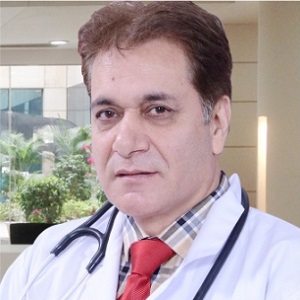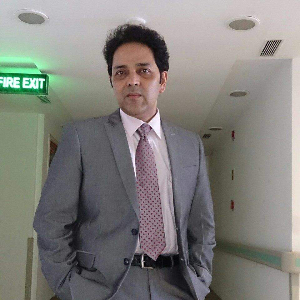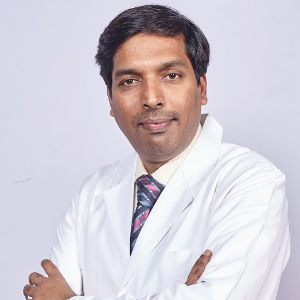Best Doctors in India for Alcoholic Hepatitis Treatment
- Gastroenterologist, Gurugram, India
- Over 17 years’ experience
Profile Highlights:
- Dr. M A Mir is a well-known Gastroenterologist and Endoscopist with a vast experience of more than 17 years in the field of Gastroenterology.
- Before joining Artemis Hospital he was associated with Pushpawati Singhania Research Institute for Liver and Digestive Diseases, New Delhi as a Consultant Gastroenterologist and Endoscopist.
- He is experienced in all gastrointestinal procedures such as diagnostic and therapeutic upper and lower GI endoscopies.
- Hematologist and Pediatric Oncologist, Mumbai, India
- Over 30 years’ experience
Profile Highlights:
- Dr. Santanu Sen is among the top-rated pediatric oncologists in India and is highly skilled in the treatment of brain, blood, bone cancer, and other types of blood disorders in children.
- Dr. Sen has been associated with one of the renowned cancer hospitals in the world, the Royal Marsden Hospital in London.
- He is currently associated as a Consultant with Kokilaben Dhirubhai Ambani Hospital in Mumbai where he also heads the Pediatric Stem Cell Transplant Program. This program holds the credit for performing Stem Cell Transplants on the youngest baby in the world (4 months for Neuroblastoma) as well as the youngest Thalassemia transplant in India (9-month-old baby).
- Radiation Oncologist, Chennai, India
- Over 24 years’ experience
Profile Highlights:
- Dr. Rathna Devi is a senior Radiation Oncologist who has an experience of 24 years in the field.
- She completed MBBS from M.S. Ramaiah Medical College, Bangalore University, and a Diploma in Radiotherapy from Madras Medical College, Dr. MGR Medical University.
- Dr. Rathna Devi’s areas of expertise include Cranial Cyberknife Radiosurgery, Intensity Modulated Radiotherapy (IMRT), and Stereotactic Body Radio Therapy (SBRT).
- Dentist, Gurugram, India
- Over 20 years’ experience
Profile Highlights:
- Dr. Anjana Satyajit is a dedicated dentist with an experience of more than two decades.
- She is an expert in Endodontics and has been treating numerous patients all over the country.
- Dr. Satyajit has received her Graduation in Dentistry from Maulana Azad Medical College in Delhi.
- Cosmetic & Plastic Surgeon, New Delhi, India
- Over 31 years experience
Profile Highlights:
- Dr. Kuldeep Singh is a prominent plastic surgeon in India with over 31 years of experience. He works as a senior cosmetic surgeon at the Indraprastha Apollo Hospital in New Delhi.
- Dr. Singh specializes in body contouring surgery, laser treatment to improve aesthetics, and microsurgery. He has performed several plastic surgery treatments with success. He takes care to leave minimum scar marks post-surgery.
- Dr. Singh is involved in many pieces of research and has several publications to his credit.
- Ophthalmologist, New Delhi, India
- Over 20 years’ experience
Profile Highlights:
- Dr. Deepali Garg Mathur is a Consultant Ophthalmologist who has completed her DNB from the National Board of Examination & MNAMS from the National Board of Examination.
- Dr. Deepali Garg has expertise in Squint, Paediatric Ophthalmology, cataracts, Lasik, Lasers, Eye Surgery, Corneal, Phacoemulsification, Eyesight problems, Glaucoma, Dry Eyes, Eye Pain, etc.
- Liver Transplant & HPB Surgeon, Gurugram, India
- Over 20 years’ experience
Profile Highlights:
- Dr. Ajitabh Srivastava is a reputed HPB and Liver Transplant surgeon in India.
- He has been a key member of teams that performed over 1500 liver transplants including living donors, deceased donors, pediatric transplants, and combined liver and kidney transplants.
- He is an expert in other complex procedures involving hepatobiliary surgery, combined liver, and Kidney Transplant, and vascular access surgery.
- Gastroenterologist & Hepatologist, New Delhi, India
- Over 30 years experience
Profile Highlights:
- Dr. Amitabha Dutta is a renowned Gastroenterologist and Hepatologist with 10 years of experience as a specialist. He has more than 30 years of professional experience in gastroenterology and general medicine.
- After practicing for 10 years in the UK, Dr. Dutta relocated to India and joined Apollo Hospitals in 1995. He was the one to set up the Gastroenterology department at Apollo Hospital, and he continues to work as a senior consultant in the Department of Gastroenterology and Hepatology at Indraprastha Apollo Hospital.
- Dr. Amitabha Dutta offers non-surgical treatment for various issues ranging from piles, skin tags, and acidity to Ulcerative Colitis and the current Coronavirus outbreak.
- He got MRCP certification from The Royal College of Physicians Of Ireland.
- Eye Surgeon, Ophthalmologist, New Delhi, India
- Over 30 years’ experience
Profile Highlights:
- Dr. Sonika Gupta is a practicing ophthalmologist with around 30 years of experience. She pursued her MBBS and MS from Aligarh Muslim University.
- Dr. Sonika Gupta is also adept at performing various eye surgeries including Cataract surgery by PHACO, Micro PHACO, LASIK Laser, PRK, Cornea transplants, C3R, other cornea, and anterior segment surgeries and lasers.
- She had undergone Observership and advanced course in PHACO, Corneal diseases, Eye Banking, and LASIK at Cornea & Laser Eye Institute, Tea Neck, New Jersey, USA
- Radiation Oncologist, Chennai, India
- Over 15 years’ experience
Profile Highlights:
- Dr. Srinivas Chilukuri has been in one of the top layers of Oncologists in the country.
- He has been the clinical lead in advanced Radiation Oncology and has successfully trained more than 200 students all over the Indian Subcontinent.
- He was one of the first radiation oncologists to develop expertise and experience in the Volumetric Modulated technique for Paediatric and Prostate Cancer.
Best Hospitals in India for Alcoholic Hepatitis Treatment
ALCOHOLIC HEPATITIS
Alcoholic hepatitis is a liver infection, which is mainly caused by frequent, heavy use of alcohol. Fat can build up in the liver cells, which might lead to inflammation as well as scarring of the liver.
Alcoholic hepatitis might be mild or severe. A patient might even need a liver transplant if proper treatment is not provided, or if they don’t stop consumption of alcohol.
It is also notable that all heavy drinkers don’t develop this condition, and sometimes this condition even develops in people who drink moderately. However, if you are diagnosed with this condition, it is important for you to quit drinking alcohol. People who continue drinking alcohol might face a huge risk of serious liver damage as well as death.
Symptoms
Depending on the amount of damage to the liver, the symptoms can vary. If you are having a mild form of the disease, you might not even experience any symptoms at all. However, as the damage continues to grow, you might experience the following:
- Changes in appetite
- Dry mouth
- Weight loss
- Pain or swelling in the abdomen
- Jaundice, or yellowing of the skin or eyes
- Fever
- Nausea and vomiting
- Easy bleeding or bruising
- Changes in your mental state, including confusion
- Fatigue
The symptoms of this condition are similar to those caused by a few other health conditions. Therefore, if you develop any of these symptoms, it is best to get a proper diagnosis as well as begin treatment.
Causes & risk factors
Alcoholic hepatitis generally develops when the alcohol you drink causes damage to your liver. However, it is not clear why alcohol does this damages only to some heavy drinkers.
Few factors that are known to play a role in this condition include:
- The body’s process that breaks down alcohol produces some toxic chemicals
- These chemicals can trigger inflammation that can destroy the liver cells
- Thus, over time, scars replace healthy liver tissue, thus interfering with the function of the liver
- This irreversible scarring, which is also termed cirrhosis, is the final stage of alcoholic liver disease
If you have hepatitis C and continue to drink, even moderately, you are more likely to develop cirrhosis.
Some heavy drinkers are also malnourished because they don’t eat a proper balanced diet. Alcohol and its byproducts also prevent the body from absorbing nutrition properly. Lack of nutrition can contribute to liver cell damage.
Some other risk factors that can lead to this condition include:
- Your sex- Women are usually at a higher risk of developing alcoholic hepatitis since the way alcohol is processed in women is different.
- Binge drinking- Having over five drinks within two hours for men and four or more for women can increase the risk of alcoholic hepatitis.
- Obesity- Heavy drinkers who are overweight are also more likely to develop alcoholic hepatitis and to progress from that condition to cirrhosis.
- Race and ethnicity- Hispanic and Negroid people might be at higher risk of alcoholic hepatitis.
- Genetic factors- According to studies, there may be a genetic component in alcohol-induced liver disease. However, it is difficult to separate genetic and environmental factors.
Diagnosis
If you are showing symptoms of alcoholic hepatitis, your doctor will first inquire about your medical history and alcohol consumption. Next, he/she will perform a physical exam to see if you have an enlarged liver or spleen. They might also need a few more tests to confirm your diagnosis, such as:
- Complete blood count (CBC)
- Liver function test
- Ultrasound of the liver
- Abdominal CT scan
- Blood clotting tests
In some cases, a liver biopsy might also be needed to confirm the diagnosis of alcoholic hepatitis. A liver biopsy requires your doctor to remove a tissue sample from your liver, which is then tested in the lab. This method helps to show the severity and type of liver disease.
Treatment
Stopping alcohol consumption is the most important treatment for alcoholic hepatitis. There is no cure for this condition, but treatment can help in reducing or eliminating symptoms, or stopping its progression.
It is also important to note that scarring of the liver is permanent, but treatment can aim to restore as much function as possible.
Dietary changes
Medication
Liver transplant
The best hope of recovery is to be aware of the signs and symptoms as well as to reduce, manage, or if possible, completely stop consumption of alcohol.
Complications
Alcoholic hepatitis might lead to severe other complications such as:
- Enlarged veins (varices)- In this condition, blood that is unable to flow freely through the portal vein, can back up into other blood vessels in your esophagus or stomach.
- Hepatic encephalopathy- This condition can be caused by the buildup of toxins if your damaged liver is unable to remove all the toxins from your body. It involves confusion, drowsiness, and slurred speech.
- Ascites- Ascites is a condition in which the fluid that accumulates in the abdomen may get infected and thus, require treatment with antibiotics. Although this condition is not life-threatening, it can be a sign of advanced alcoholic hepatitis, or cirrhosis.
- Kidney failure- A damaged liver affects blood flow to the kidneys, thus resulting in kidney failure.
- Cirrhosis- The scarring of the liver might lead to liver failure.
Prevention
Alcoholic hepatitis might be prevented if you take the following steps:
- Drink alcohol in moderation, if at all- For healthy adults, moderate drinking means no more than one drink a day for women of all ages and men older than 65, and not over two drinks a day for men aged 65 and younger. However, if you prevent all alcohol, it is a certain way to prevent this condition.
- Check before mixing medications and alcohol- Ask your doctor if it’s safe to drink alcohol while you are taking medications. Consider reading the warning labels on over-the-counter medications as well. Don’t drink alcohol when you are taking medications that warn of complications when combined with alcohol.
- Protect yourself from hepatitis C- Hepatitis C is an infectious liver disease that is caused by a virus. If it is left untreated, it may lead to cirrhosis. If you are having hepatitis C and you consume alcohol, you’re generally more likely to develop cirrhosis than if you don’t drink.















